Are you looking to get an HR compliance certification?
HR Compliance and Regulations are the fundamental building blocks of Human Resources, providing a strong and stable structure for all HR activities.
HR compliance involves a wide range of policies, laws, and best practices to ensure fair treatment, safety, and equal employment opportunity for all employees within an organization.
By adhering to these regulations, businesses can create a positive and supportive work environment that fosters growth, development, and overall employee satisfaction.
Compliance is also key in helping organizations mitigate legal risks and avoid penalties associated with non-compliance, such as fines, lawsuits, and reputational damage.
So, every organization needs HR professionals with compliance knowledge – especially once it starts growing and expanding its operations.
So, investing in HR compliance training courses and certifications is a strategic move for HR professionals and organizations.
These training courses help professionals broaden their understanding of compliance requirements, including record-keeping, selection assessment processes, risk mitigation, and more.
Top Rated HR Compliance Certification Courses
As the demand for compliance professionals grows, numerous HR compliance training courses have emerged to cater to this need. Here are the top HR certification courses with details to help you decide what better fits your needs.
1. HR Management Certification by HR University
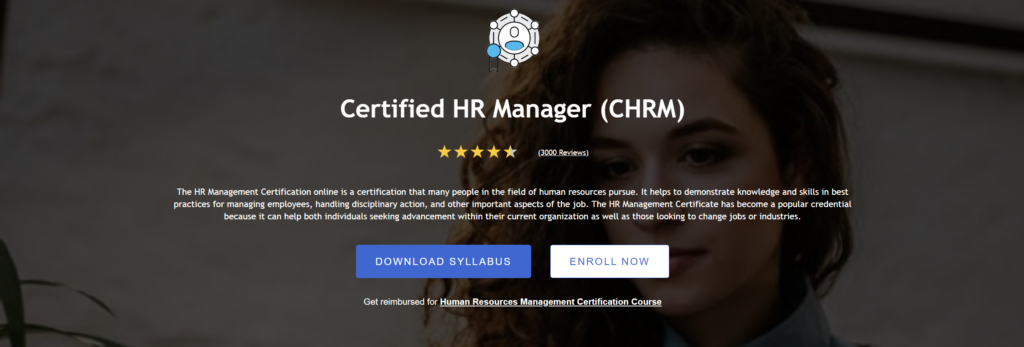
The HR Management Certification is one of the most popular courses for professionals looking for a comprehensive learning experience. It contains over 90 lectures, 30+ case studies, and exclusive interviews with industry experts. Continuously updated with new content, the course provides students with valuable insights and knowledge to excel in human resources.
Students gain a thorough understanding of the key fundamentals of HR, including employee relations, labor laws, HR compliance requirements, and workplace policies. They master strategies for acing HR interviews and learn how to differentiate themselves as exceptional candidates for the job.
- Online, self-paced (study 4 hours/week to finish in 10 weeks)
- Comprehensive coverage of HR compliance topics
- Suitable for HR professionals at various stages of their career
- HR University runs one of the world’s largest communities for HR professionals, with thousands of global members from 500+ companies
2. SHRM-CP (Society for Human Resource Management Certified Professional)
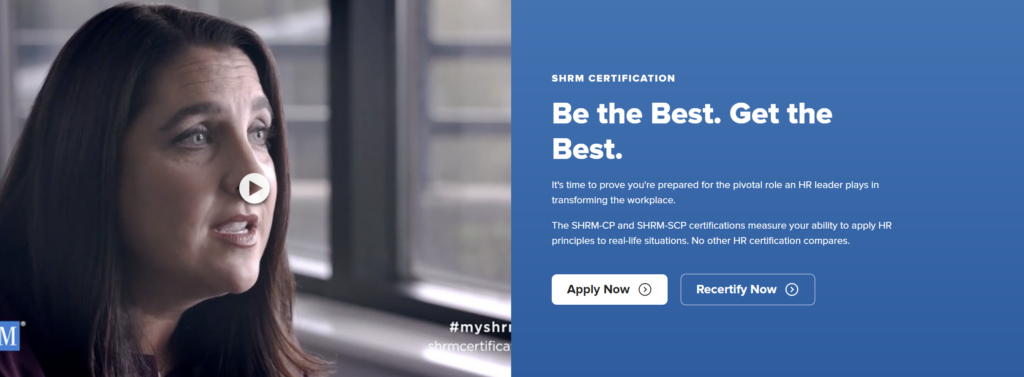
The SHRM-CP certification, offered by the Society for Human Resource Management, is designed for early to mid-career HR professionals. This certification covers aspects of HR compliance, including employee relations, HR laws, and workplace policies.
- Tailored for early to mid-career HR professionals
- Covers key aspects of HR compliance
3. SHRM-SCP (Society for Human Resource Management Senior Certified Professional)
The SHRM-SCP certification, also offered by the Society for Human Resource Management, is designed for senior-level HR professionals. This certification focuses on advanced HR compliance topics, such as managing complex workplace issues and developing strategic HR policies.
- Designed for senior-level HR professionals
- Covers advanced HR compliance topics
4. PHR (Professional in Human Resources) by HRCI (Human Resource Certification Institute)
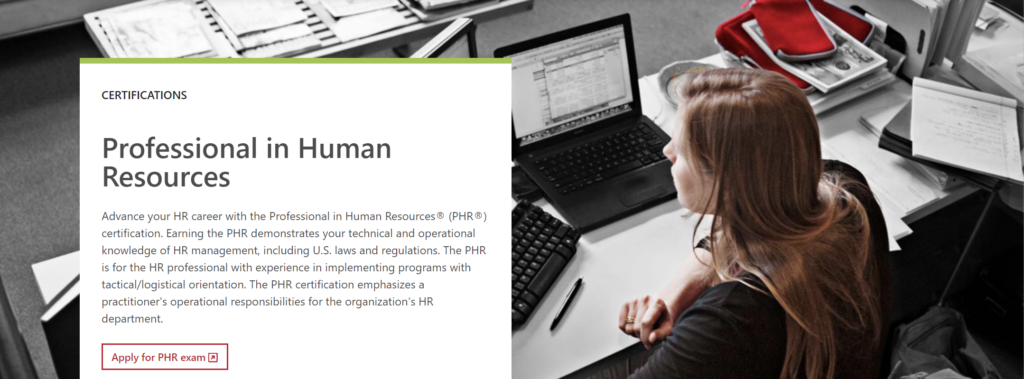
The PHR certification, offered by the Human Resource Certification Institute, is well-respected in the HR industry. This certification covers various aspects of HR compliance, including employee relations, labor laws, and policies for legal compliance issues.
- Well-respected certification in the HR industry
- Covers various aspects of HR compliance
5. SPHR (Senior Professional in Human Resources) by HRCI

The SPHR certification, also offered by the Human Resource Certification Institute, is designed for senior-level HR professionals. This certification delves deeper into HR compliance topics and emphasizes strategic HR management and policy development.
- Targeted at senior-level HR professionals
- Covers in-depth HR compliance topics
- Emphasizes strategic HR management and policy development
6. AIRS Certified Diversity and Inclusion Recruiter (CDR) Certification
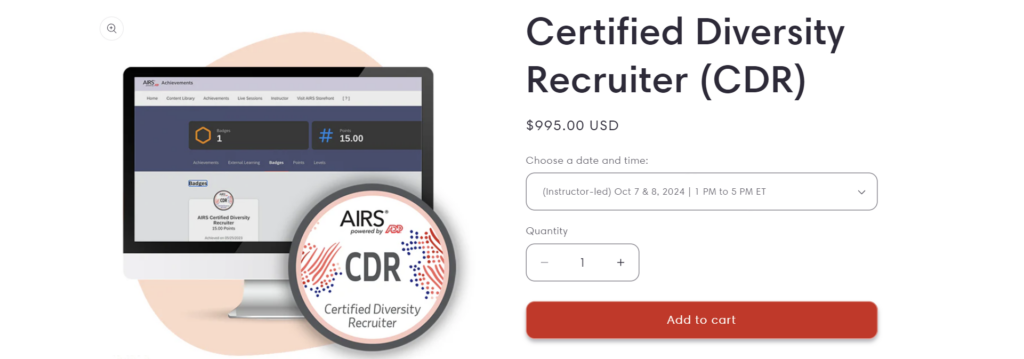
The CDR Certification offered by AIRS focuses on diversity and inclusion in recruitment. This certification helps HR professionals ensure that their organization’s talent acquisition strategies comply with diversity and inclusion regulations.
- Focuses on diversity and inclusion in talent acquisition
- Helps HR professionals ensure compliance with regulations
7. CCP (Certified Compensation Professional) by WorldatWork
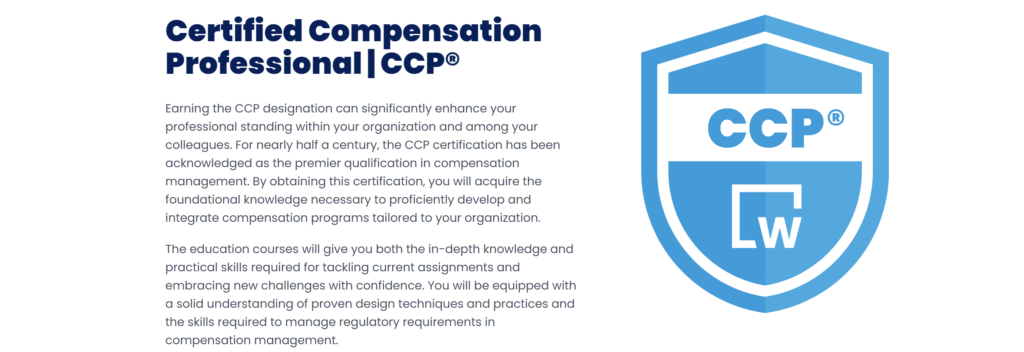
The CCP certification, offered by WorldatWork, focuses on compensation management and compliance. This certification suits HR professionals responsible for designing, implementing, and managing compensation programs that adhere to legal and regulatory requirements.
- Concentrates on compensation management and compliance
- Suitable for HR professionals responsible for compensation programs
8. CEBS (Certified Employee Benefit Specialist) by the International Foundation of Employee Benefit Plans and the Wharton School of the University of Pennsylvania

The CEBS certification focuses on employee benefits management and compliance. It is ideal for HR professionals who design, implement, and manage employee benefit programs that comply with relevant laws and regulations.
- Focuses on employee benefits management and compliance
- Ideal for HR professionals responsible for employee benefit programs
- Offered in partnership with a prestigious business school, the Wharton School of the University of Pennsylvania
FAQs
Here are the most frequently asked questions about HR compliance training.
What is HR compliance training?
HR compliance training is a series of educational programs to ensure employees and management understand and follow all relevant laws, regulations, and policies. It covers areas like workplace safety, fair labor standards, and anti-harassment.
Why is sexual harassment training important in the workplace?
Sexual harassment training is essential to maintain a safe and respectful workplace. It helps employees recognize unacceptable behavior, understand their rights, and know how to report incidents, thereby creating a more inclusive and compliant work environment.
Who needs to complete sexual harassment training?
Most employers must provide sexual harassment training to all employees, including supervisors and new hires, based on specific state or country regulations. Meeting these requirements is essential to ensure compliance and foster a safe work environment.
What topics are covered in human resources compliance training?
Human resources compliance training covers various topics, including workplace safety, sexual harassment prevention, fair labor standards, non-discrimination policies, and other regulations that protect employees and employers alike.
How often should workplace compliance training be conducted?
The frequency of workplace compliance training varies based on company policy and local regulations. Generally, training should be provided at onboarding and refreshed annually or whenever relevant laws are updated.
What are the sexual harassment training requirements for companies?
Sexual harassment training requirements vary depending on federal or state laws. Many jurisdictions mandate that companies provide regular training to employees and managers, with different requirements based on company size and industry.
How does workplace compliance training benefit employees?
Workplace compliance training benefits employees by ensuring they understand their rights, workplace safety protocols, and the standards of conduct. It helps create a safer, more respectful workplace and protects employees from unfair treatment.
What is included in workplace safety training?
Workplace safety training includes instructions on preventing accidents, responding to emergencies, understanding safety procedures, and maintaining a hazard-free environment. It’s an essential aspect of overall HR compliance.
Why is training on fair labor standards necessary?
Training on the Fair Labor Standards Act ensures employers and employees understand wage laws, overtime regulations, and employee rights. This helps prevent violations that could result in costly fines and contributes to a fair and ethical workplace.
Can HR compliance training be done online?
Yes, HR compliance training can often be done online. Many organizations offer e-learning modules that cover topics like sexual harassment, workplace harassment, and fair labor standards, allowing for flexible and efficient learning.




























